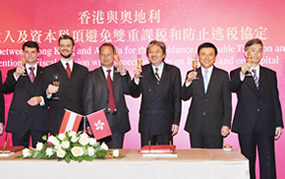 In 2010-11, IRD collections climbed to a record high of $209 billion, an increase of $30 billion from the previous year. The result was most encouraging.
In 2010-11, IRD collections climbed to a record high of $209 billion, an increase of $30 billion from the previous year. The result was most encouraging.
The Hong Kong economy achieved a full-fledged upturn in 2010, successfully overcoming the global recession triggered by the financial crisis. For each of the major taxes, a significant growth was noted compared to the previous year. Backed by higher business profits, profits tax collection recorded a 22% growth and went up to $93.2 billion. Salaries tax collection reached an all-time high for the third year in a row, growing by 7% to $44.3 billion. The vibrant property and stock markets brought in stamp duty of $51 billion, a 20% increase year-on-year. Betting duty also broke its record and leaped by 16% to $14.8 billion.
Whilst the growth in our revenue collection is most welcoming, it brought about challenges to IRD at various fronts. Tax assessment and collection work are becoming more complicated, a legacy of the bullish economy and the globalization of business activities, which resulted in more voluminous and complex financial and commercial transactions. This situation is most obvious in profits tax cases. Assessing officers are now required to collect and analyze a large amount of facts to get the full picture for each case before they make a tax assessment. The Department has been actively providing training opportunities to strengthen the professional competency of our staff team and to enhance the overall work efficiency. Indeed, I am always deeply impressed by my colleagues at all ranks, who face the challenges with their usual diligence and perseverance, and deliver excellent results at all times.
The tax laws of Hong Kong are simple and clear. Tax rates are low and tax types are few. Only business profits, salaries and wages, and property rental income derived in Hong Kong are subject to tax. This simple and clear tax system is well proven; it is highly acclaimed by many jurisdictions worldwide and has served Hong Kong well for decades. Its success reflects the Administration's prudent fiscal policies in keeping public expenditure within our means, and taxpayers' high degree of compliance with the tax laws. To strengthen tax education, we constantly update the contents of the IRD website to provide a full range of up-to-date tax information. In particular, we issue Departmental Interpretation & Practice Notes on various tax topics under the Inland Revenue Ordinance and the Stamp Duty Ordinance. These have proved to be very useful to tax practitioners and the taxpaying public in general.
At the same time, we continue to expand our international tax treaty network. In the past year, Hong Kong has made remarkable achievements in this area. Effective from March 2010, the Inland Revenue Ordinance was amended enabling Hong Kong to exchange tax information with our treaty partners using the 2004 version of the Article on Exchange of Information, which is the latest standard promulgated by the Organisation for Economic Cooperation and Development (OECD). Up to 31 March 2011, we have signed comprehensive double taxation agreements (CDTAs) with 16 countries adopting such standard.
 Building a wide CDTA network is conducive to Hong Kong's long-term economic development and will enhance our role as an international trading and financial centre. The negotiation timetable and choice of countries are determined with the overall well-being of Hong Kong in mind. We will give priority to our major trading partners and those with potential for economic development. We will also readily consider suggestions from the industry.
Building a wide CDTA network is conducive to Hong Kong's long-term economic development and will enhance our role as an international trading and financial centre. The negotiation timetable and choice of countries are determined with the overall well-being of Hong Kong in mind. We will give priority to our major trading partners and those with potential for economic development. We will also readily consider suggestions from the industry.
Once a tax treaty is signed, Hong Kong will seek to complete the legislative procedures the soonest possible, while time would be allowed for our treaty partner to do the same in her home country. To update the public with the latest position, we have redesigned our web corner on double taxation relief to show the progress of ratification for all our concluded treaties.
As these tax treaties go through the legislative procedures one after the other, I would expect new challenges faced by IRD in putting them into implementation. I am confident that IRD colleagues will take on this new sphere of work with their usual commitment and professionalism.
All along, Hong Kong has shown clear support to the international community in enhancing tax transparency, and participated actively in OECD's relevant Forums. In September 2009 in Mexico, OECD formed a new Global Forum on Tax Transparency and Effective Exchange of Information. Hong Kong is a member of this new Forum and participates in the peer review process administered by the Forum. Phase 1 of the peer review assesses a jurisdiction's legal and regulatory framework, while phase 2 focuses on the actual implementation of the framework. Hong Kong has gone through phase 1 in the first half of this year and is expecting to do phase 2 in the second half of 2012. I well believe that through the review process, it can be established that Hong Kong is a highly transparent tax jurisdiction that diligently fulfills her obligations under the relevant CDTAs entered into.
Last but not the least, I wish to express my hearty thanks to taxpayers, professions, trades and industries as well as my IRD colleagues for their support and assistance in all these years. In a spirit highlighted by our slogan "Tax by the law Service from the heart ", IRD will continue to serve the people of Hong Kong, by the law and from the heart.
CHU Yam-yuen, J. P.
Commissioner of Inland Revenue
